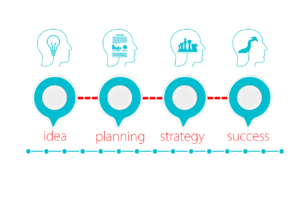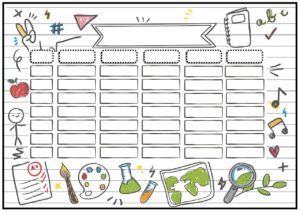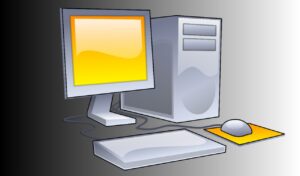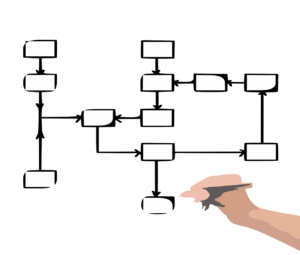
Best Ways of Studying –To be successful in education as well as in business, effective study is essential. Whether you’re a student preparing for exams or someone looking to acquire new skills and knowledge, the methods you use to study have the power to change the world. We provide the best study methods to help you maximize your learning potential and achieve your goals.

The Art of Effective Study: Best Practices for Success
- Set Clear Goals
- Create a Study Schedule
- Choose the Right Environment
- Active Learning
- Use Active Study Techniques
- Take Breaks
- Stay Organized
- Prioritize Sleep and Nutrition
- Seek Help When Needed
- Test Yourself
- Stay Motivated
- Embrace Technology
- Review and Revise
- Stay Positive and Manage Stress
- Adapt and Evolve
Set Clear Goals

Before researching different study methods, it is essential to start with a clear understanding of your goals. What do you want to achieve through your study sessions? This question sets you specific, achievable goals. It gives purpose and direction to your studies. Whether it’s taking an exam, mastering a new language, or acquiring job-related skills, having a well-defined goal keeps you motivated and focused.
Create a Study Schedule

Time management is a very important factor for effective study. So develop a study schedule that fits your goals and lifestyle. Set aside a special time for studying every day and stick to the allotted time. Consistency is paramount when it comes to information retention and skill development. Avoid cramming and last-minute rushes, as they are less effective in the long run.
Choose the Right Environment

It is very important to read with concentration if you want to remember what you have studied in your mind. So choose a quiet and comfortable place free of distractions. Ensure good lighting and ventilation to create a conducive environment for learning. Some people prefer the library for concentrated reading, while others thrive in the comfort of their own room. Choose the one that sounds best to you here.
Active Learning

Active learning is a powerful technique that allows students to actively engage with the material rather than passively. Some methods of active learning are:
Summarizing: After reading a section or completing an assignment, try to summarize the main points in your own words. It helps to consolidate your understanding.
Question: Ask questions about the material as you read. What are the key concepts? How are they related to each other? It encourages critical thinking.
Teaching: Imagine you are explaining a topic to someone else. This teaching helps to solidify your understanding and identify gaps in your knowledge.
Practice problems: Practice problems are invaluable for subjects like math or science. They strengthen your understanding of concepts and improve problem-solving skills.
Use Active Study Techniques

In addition to active learning, specific study methods that have proven to be most effective include:
Spaced Repetition: This technique involves reviewing the material at increasing intervals over time. This affects the mental spacing effect, making it easier to retain information in long-term memory.
Flashcards: Create flashcards with key information, terms, and concepts. Review them regularly to strengthen your memory.
Mind Mapping: Visualize complex ideas by creating mind maps or concept maps. It helps to organize information and understand relationships between concepts.
Mnemonics: Mnemonics are patterns for remembering information more effectively.
Take Breaks

While studying for long periods of time can be tempting, research shows that taking regular breaks can improve retention and concentration.
Stay Organized

Effective study requires good organization. Organize your notes, textbooks, and study materials. Use folders, digital tools, or apps to organize your study resources. These will save you time and reduce frustration as you quickly identify what you need.
Prioritize Sleep and Nutrition

A well-rested mind is more willing to learn. Practice proper sleep to adapt body parts. Additionally, maintaining a balanced diet and staying hydrated can positively affect your ability to concentrate and retain information.
Seek Help When Needed

Don’t hesitate to seek help if you face challenges in your studies. Reach out to teachers, professors, tutors, or fellow students for help. Otherwise, almost any information you want is available online these days. For this, joining study groups or online forums related to your subject can provide valuable insights and support.
Test Yourself

Simple self-assessment is a powerful tool to learn your understanding and identify areas that need improvement. Practice quizzes, sample tests, and self-tests help you gauge your progress and adjust your study strategies accordingly.
Stay Motivated

Staying motivated throughout your study journey can be challenging. To stay motivated:
Remind yourself of your goals and the reasons you embarked on this learning journey.
Break your goals down into smaller, achievable milestones.
Reward yourself when you reach important milestones or achieve your goals.
Get inspired by reading success stories or connecting with others who are pursuing similar goals. All these help to increase your concentration and keep you curious.
Embrace Technology

Use note-taking, digital tools, and apps in your study efforts. Also, various educational websites and online courses on the Internet provide different learning resources and opportunities.
Review and Revise

Regularly review and revise previously studied material. It helps strengthen your memory and enables you to retain information for a long time. The spaced repetition techniques mentioned earlier are particularly helpful for this purpose.
Stay Positive and Manage Stress

A positive mindset will enhance your learning experience. So avoid negative self-talk and self-doubt. Manage stress through relaxation techniques, exercise, and mindfulness practices. Know that a calm and focused mind is more conducive to learning.
Adapt and Evolve

Remember that the best ways to study develop over time. As you gain experience and encounter different subjects or challenges, be prepared to adjust your study methods. Know that what works for one subject may not work for another and this is quite normal.
Conclusion
Effective study is a combination of strategic planning, active engagement with the material, and a commitment to continuous improvement. By setting clear goals, creating a conducive study environment, and using active learning methods, you can increase your ability to absorb and retain knowledge. Best Ways of Studying.
Note: The contents here are just for understanding.